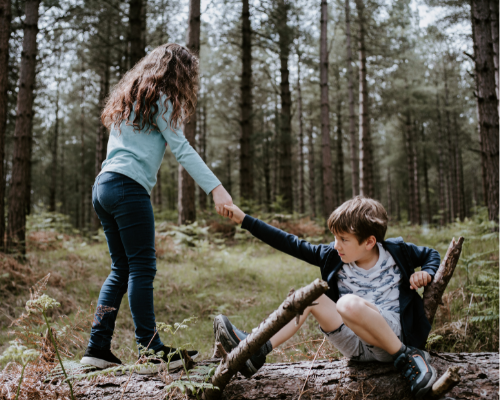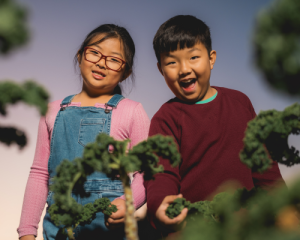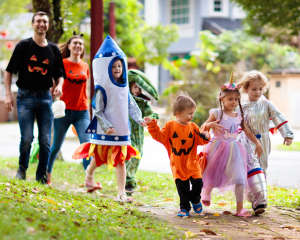Embodying kindness can offer children many benefits for themselves and others.
Is the word kindness overused? The truth is that it is easy to dismiss kindness as a catchphrase in this busy world we live in. However, kindness can never be an overdone idea! The best way to ensure that kindness does not get evaporated down to a catchphrase with our kids is to show them how to live kindness. This means understanding that kindness is:
- Connection
- Empathy in motion
- Recognition of the dignity of others
- A counterbalance to the hate in the world
- A way to reveal our truest self to another
- A way to remind ourselves of the value of others
Kindness is not just a feel-good concept. Yes, we practice kindness because it’s the right thing to do. However, it goes much deeper than that because staying focused on kindness allows a person to continually mold their conscience toward being good and true. Multiple studies link kindness with a long list of emotional, social and psychological benefits. Take a look at the reasons why showing your kids how to practice kindness is essential.
#1 Kindness Is Linked with High Self-Esteem
Treating others with kindness gives the person spreading the kindness benefits. Have you ever heard of something called the helper’s high? When we are good to others, we feel good because our bodies are flooded with positive emotions. Being kind helps us to feel useful, needed, productive and optimistic. A 2017 study involving 681 adolescents between the ages of 11 and 14 found that positive behaviors toward friends, family members and strangers helped create feelings of higher self-esteem.
#2 Kindness Can Help Your Child Be a Better Student
Kindness creates a positive cycle that keeps on giving to everyone involved. An attitude of kindness helps students feel confident. It can also help the people around that student feel safer, more connected and less worried about bullying. This creates an environment of collaboration and communication that simply helps everyone learn better. What’s more, the child who leads by kindness in school displays positive leadership qualities that may create academic opportunities.
#3 Self-Compassion Reduces Depression and Anxiety
When drilling down on the importance of kindness with your kids, do not forget to talk about kindness to yourself. It is important to show your child how to integrate kindness as a genuine part of their identity. It can be easy for kids to think that kindness is a performative outward gesture that they can share with others. However, true kindness becomes a part of who a child is. As a result, self-compassion becomes a regular part of a child’s relationship with themselves. Negative self-talk can make a child more vulnerable to depression and anxiety. This is why children should be given tools for treating themselves with kindness instead of developing habits of self-blame, self-shame or self-loathing. Research shows that practicing self-compassion is linked with reduced symptoms of anxiety and depression. It may also help kids avoid dependency issues with alcohol and drugs in the future.
Knowing How to “Live Kindness” Improves Every Part of a Child’s Life
Kids may turn to bullying to feel empowered because they have not been taught how to practice true empowerment. The truth is that treating others with kindness is the ultimate way to live an empowered life that generates positive benefits. It is easy for kids to assume that asserting negative power over someone is a way to feel powerful. However, science shows us that the physical and emotional benefits of kindness generate true self-possession while positively influencing others. Kindness is not a fluffy catchphrase. Kindness is the rock-solid foundation for building a powerful, positive life.
Related Posts:
- 5 Exercises to Help Your Kids Develop a Mindful Brain
- Practical Mindfulness Tips for Parenting During COVID
- Support Children Building Their Passions
Try this mindfulness exercise to help foster kindness and compassion. This exercise will teach children how to orient their thoughts toward positive things. They will also learn how to begin to take stock of the automatic thoughts that they usually ignore, as a way to recognize how our thoughts impact our experience. Here’s how to walk your child through the meadow of kindness that is blooming in their mind:
- Step 1: Get a large, blank piece of paper for your child.
- Step 2: Explain that this blank space is a meadow waiting to be populated by your child’s positive thoughts.
- Step 3: Throughout the month, have your child keep a tally of every positive, kind or warm thought they have about another person. They can choose to mark down their thoughts in real-time, spend a few minutes each night remembering all of their positive thoughts from throughout the day, or use any other method they prefer for recording their positive thoughts.
- Step 4: Have your child draw a flower for each positive thought they have. They can even choose to represent stronger thoughts with larger sizes, stronger colors or other special touches for a more accurate visual representation of the impact of a thought.
Your child will have a meadow of their own making at the end of the month. If your child’s meadow does not have many flowers, spend time talking about ways to cultivate more positive thoughts. Seeing the way that the thoughts fill the meadow to create color and liveliness creates a visual representation of just how powerful each thought is for creating the meadow that is your child’s mind.
Anthony Cupo is a trained mindfulness facilitator (TMF) from the UCLA Semel Institute for Neuroscience and Human Behavior. He is a co-owner of Stepping Forward Counseling Center, LLC and has been meditating for over 30 years.












Leave a Reply